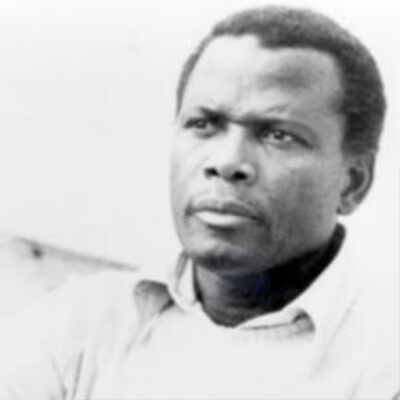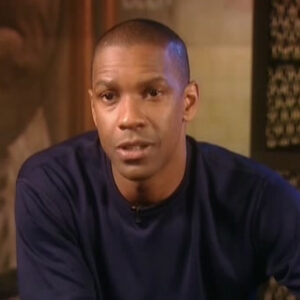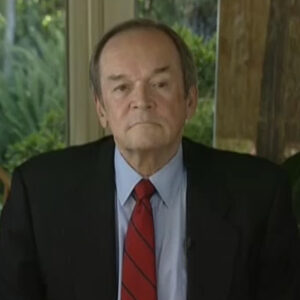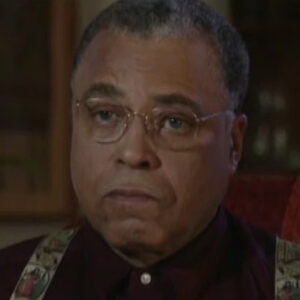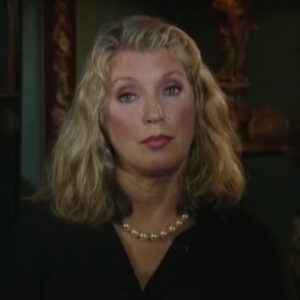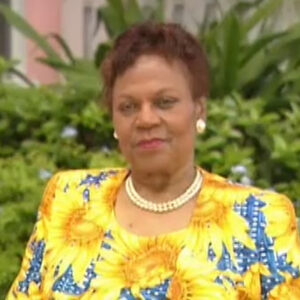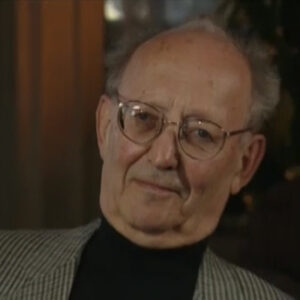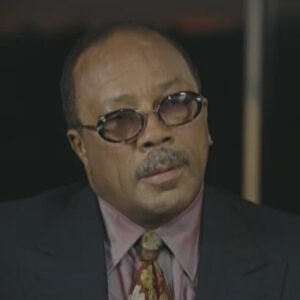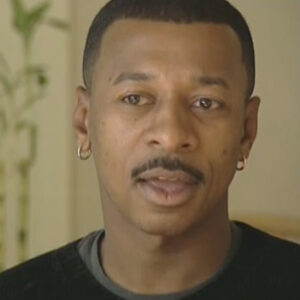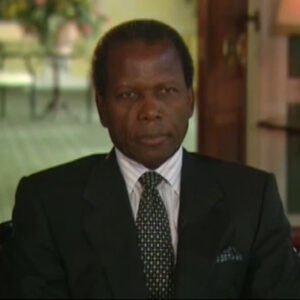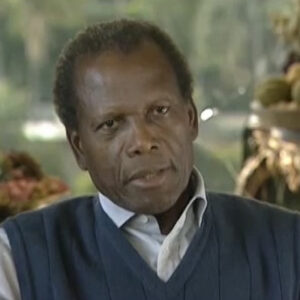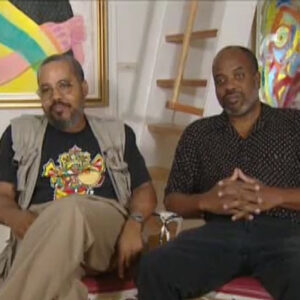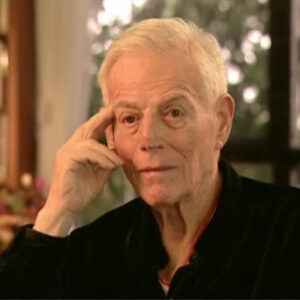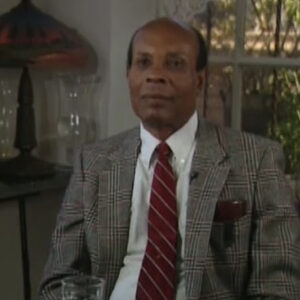Speaker But when I hit 70, his father, I think, died. And so he got a sense when he hit 70 that it was time for him to die, that it was like that fourscore thing from the Bible and it had such a psychological impact on him. And it kind of scared me, you know, because, you know, that’s our class, you know, everything.
Speaker And I thought and I thought, you know, it’s really it’s it’s in your head.
Speaker But, you know, I know don’t look back because I was going to keep running, you know, because I catch up with you and catch up with you.
Speaker So but it’s this and I guess it’s also related to your world view, your life, you and that you if you feel that you’ve accomplished all that you can accomplish, then it’s time to check out, you know, in a way psychologically.
Speaker You know what if if you’ve if you have this sense of growth and development, which is Sydney, we’re getting into Sydney. Sydney, really. I mean, he doesn’t stop where he is or I thought I thought that he was going to sort of, you know, after a while, just sort of pack up and sort of almost leave. But he hasn’t you know, he’s right there. He’s but he’s changed his his mindset to loftier, more spiritual and more, let’s call it mystical, all kinds of concerns which will take him to a hundred, you know, if if his health and everything else holds up so that he sees himself in a much more. How can I say a much more wholesome way that it’s not just tied to, let’s call it the industry? And so to me, the fact that he’s an ambassador, you know, now along with everything else, a golfer, so on the fact that he’s doing that now is really right for him at this stage of his life, because in a curious way, he’s always been an ambassador, you know, as a person.
Speaker He’s been an ambassador for the black community and an ambassador for the white community, for the for America really unofficially, you know, an ambassador.
Speaker And he he now he now is in this official position, which gives him a chance to really work with areas that he has been working with all along in terms of developing his career. You know, he’s he’s he’s become progressively, let’s call it an insider, you know, in the Hollywood establishment. And he he knows that the ground rules of insider, you know, life and behavior and activity.
Speaker And so he now can function very facilely, I would think, as an ambassador from the Bahamas to Japan. And, you know, he’s a very bright guy, very obscure and has a mind like a sponge or absorbs information.
Speaker And he retains and he does get you know, well, of course, he’s an actor. So actors have a tendency to have this curiosity to know he is curious, very, very curious.
Speaker And he does manage to somehow take the fruits of his curiosity and use them in his craft and use them in his life. You know, and he is a kind of extraordinary guy.
Speaker You talk about the spirituality for a minute and what area is he exploring spirituality and how they both talk about it?
Speaker Well, you know, we sort of dance around the issue of spirituality because spirituality is a thing that you can’t really discuss for it to remain spiritual, because it transcends the the level of consciousness that we’re on right now in our talking here. It has to do with the areas of of of awareness that are beyond the range of articulation, beyond the range of of my saying, well, this is a spiritual thing, the books of many books written and so on.
Speaker But it doesn’t come to a head until you attain moments of Sertori or samadhi, which are these are the Indian and so on terms for for elevated consciousness. But he he has that now. I can’t speak for Sydney on that level. All I know is that Sydney in a way has always been somewhat spiritual. I mean, he’s, he’s always had an element of mystery about it, you know what I mean? And and he and I have been friends for 100 years, really 50 anyway.
Speaker And he has always had this other level of awareness that frankly, is the thing, I think that has guided him throughout his life and his career and is now, interestingly, beginning to flower as a major motor in his behaviour, you know, made it a major determinant in his behaviour, which is why I said he’ll go on for another 30 years or whatever, because he’s on a different wavelength now where he doesn’t he doesn’t need the approbation of Hollywood.
Speaker He doesn’t need any of that. Or that tribute that they did to him was just a wonderful you know, I mean, he was very worshipful, you know, and everybody paid homage to Sydney and so on.
Speaker But he he doesn’t really need that. I mean, he was appreciative. And so people who wouldn’t be. But he didn’t really need it anymore, you know. And you could tell that while he enjoyed it.
Speaker And if you look at those images of Sydney during that tribute to you, did you say he you know, he was reflecting on it as anyone on a spiritual level would? You know, what does this mean? How does this tie in with my life, with my ego? When do I still cater to the demands of my ego in the way I used to before? I mean, they are actors today and obviously if they got that type of attention, they would line up with, you know, huge boom, you know, because it’s very ego bracing.
Speaker And on the other hand, he sees it in perspective because certainly in Hollywood, there are a lot of tributes and very little work, lots of tributes.
Speaker And I love it. Well, you know, in a curious way, that’s that’s true.
Speaker But I think it’s also true that the tributes do help people to refocus on one’s contribution, one’s legacy, one’s, you know, relationship to the industry and to what the person has done.
Speaker So I don’t think it’s all is lost by a tribute.
Speaker As a matter of fact, I don’t know this, but the Mandella production. Have you seen. Yes. You are in the Mandella production. I think part of that may have come out of that tribute. I don’t know. I mean, some of the background thinking that, hey, why don’t we get Sydney to play Mandela, you know, or or Sydney, man, say, listen, this is this is what I want to do at this time of my life.
Speaker And he suggested someone and I do think that that those two men came together in a remarkable way.
Speaker Oh, my word. I mean, you know, I sat in that theatre and I said, well, Sydney is going to play Mandela. Good luck. You know, Mandela is a major human being on the face of the earth, the likes of which won’t be seen for another while. And I said, you know, Sidney and I sat in the theatre and I started looking at the screen. And then I found myself drawn into Mandela and I said, you know something? This is Sydney’s major triumph artistically. I mean, his craft was absolutely intact. He had the veneer of of Mandela, but he also had the inner life of Mandela. I mean, he he understood the mental mechanisms, the emotional mechanisms that were underpinning a lot of his behaviour so that he was just absolutely wonderful.
Speaker And I told him, I said, you know, I’ll tell you, I think this is I think this is here this is your masterpiece.
Speaker And I was surprised that somehow it never it didn’t I don’t I don’t think it got him an word of any kind.
Speaker But it should I mean, you know, it’s an Academy Award performance. And anybody who hasn’t seen it, it’s you know, it’s missing something, I think, of Sidney.
Speaker I mean, when you look at Sidney, then as in contradistinction to Sidney, you know, when he first started off, which is let’s go back to that, he was there.
Speaker Oh, yeah, I was there at the creation. Let me just wait for.
Speaker Yeah.
Speaker Sidney and I go back to the American Negro Theatre and Harlem, 134 Street and 7th Avenue.
Speaker We used to hang out there into the late hours of the night. We used the city as a boulevard and 7th Avenue. I think it’s called Adam Clayton Powell.
Speaker This playing field gives me a chance to get rid of some of these people I know just out of this have to.
Speaker These lights. Can I help you? I was saying that we used to hang out on Adam Clayton Powell Boulevard, I’m sure that’s the name. And at late hours of the night, we used to sit on the Boulevard and Avenue and one, two or three o’clock in the morning, no worry about crime or anything like that.
Speaker And we were just a very affable time for us.
Speaker I mean, in terms of like summer or autumn, you know, and then sometimes we’d go across the street to a restaurant called the Ritz. It was a very nice West Indian gentleman there named Mr. Lewis, who used to that was his place. And he he was he was very nice because he would tolerate us because we didn’t have any money mean we just, you know, came in here to get some tea or coffee or one one piece of toast or something that we might share, that kind of thing. I mean, it was a very I wouldn’t call it pristine, but was a very stringent, austere kind of life. I mean, not of our choosing, but because of the nature of the business and the show business at that time.
Speaker Theater and in America, you know, is not the friendliest environment for people of color.
Speaker So we were very much together and with other people, there were a number of other people. It was a sort of a group of us, you know, just sort of house would have well, you know, and there was a fellow named Horace Carter and Harry Potter, Harry Harry was again coming into that circle of that group of young actors at the American Negro Theater.
Speaker And Harry, of course, and suddenly became very close. And frankly, I became close with Harry myself and of course, Sidney. And and so that period was a very wonderful period for us because we were aspiring, you know, and we were watching America very carefully. And I guess we were growing into the kind of political consciousness at the same time because America was playing havoc with people like candidate Lee who were established actors, you know, candidly. And Paul Robeson here were these these idols of ours, you know, who were being.
Speaker The. All of being, you know, messed over by by this country.
Speaker So present, still so painful this time, anyway, what we saw, we were watching this country and we decided that I mean, certainly, Harry, all of us, that we had to somehow do things that would change the environment. So, Sydney, I learned a tremendous amount from Paul Robeson and the experience of Canada, Lee and he then he moved into this Hollywood arena.
Speaker I struggled I wouldn’t say luck, but good fortune. And he then proceeded to make his way through this Hollywood environment, which is a very tricky environment made of the made up of the good guys and the bad guys, you know, and you have to find out who the good guys are and who the bad guys just like the movies, you know. And he found he found for himself all the good guys in Hollywood. And he moved with them and he avoided these other people.
Speaker And he and he managed to build a career for himself and he survived, whereas in the case of Canada and Robeson, they could not overcome a hostile racial climate of this country at that time. And as a matter of fact, the kind of leader mentioned this before, is it two weeks before he died?
Speaker He told me that. That he was going to die.
Speaker And anyway, said close friends. Yeah, so the important thing is that Sidney managed to survive and he has out of this adversity, out of this tremendous these tremendous challenges that he had to cope with.
Speaker He managed to to emerge as a as a person who is not only a gifted actor, but one who understands how that crazy world out there works and who has managed to like a surfer to surf on those various currents that are constantly coming up and under and trying to throw him off his surfboard.
Speaker And he you know, he just glances the you know, he’s like a belly dancer and he goes right straight through that end and that’s where he is.
Speaker And, you know, I applaud him, you know, and I sometimes when I’m with him, sometimes we get and I say to him, you know, I’m going to sit down at your knee and find out exactly how you know.
Speaker And he throws his head open.
Speaker Laughs You know, so anyway, that’s but I’ve been having a terrible case of verbal diarrhea. What would you ask me some questions?
Speaker Yeah, I will. But this is just fine. Don’t say verbal diarrhea. This has just been so wonderful as an overview. No.
Speaker You know, because he has been you know, it’s not luck. You know, he he really has known how to surf. Oh, yeah. That should I place um, let’s let’s talk about Sydney’s privacy first, how that, you know, does not do these things ordinarily and just.
Speaker Well, you know, I’ll tell you something about Sydney and privacy. I mean, Sydney, one of the things that he’s very astute about is he knows how corrupt the media can be.
Speaker I mean, he understands that, you know, he’s watched how the media wrecked robots and wrecked constantly wrecked other people who are not black, but who are people of goodwill and people who are trying to do positive things in this society.
Speaker And he’s seen all of this. You know, he’s not full and he’s not about to allow some crazy reporter to come into his house or there’s a place down there in Cat Island or wherever he is, and Beverly Hills, he’s not allowed to allow such a person to come in there and rape him, you know, and take certain things that he might say off the record or whatever and use them to pursue their agenda, you know, because of the the media and camera included. And it’s a very curious thing. It’s it’s it can be very destructive, can be very corrosive and destabilising of a person’s mental health, psychology or society, or it can be very nourishing. It depends on how it’s being used. And Sydney has seen too many instances of the destruction that has been wreaked on people in high places, shall we say. And he’s not about to subject himself to that. He’d rather go off and meditate somewhere, saw or read a book or whatever. So he has been on a number of occasions, at least three or four times people have asked me because they know that I have a friendship with him.
Speaker They have wanted to do this in-depth story. And they they told me how, how, how positive this is going to be, how wonderful. And he he he just turned it down because he knew wasn’t what I owe these cats function. And the fact that he’s taken he’s agreed to do it for you is I think it’s a compliment that he trusts you, you know.
Speaker And so I think that he will unfold himself more with you than he would with the average person that he has known for some time. But he is a very private person and even says, you know, he you know and I know that he is he’s very private. I’ve known for all of this time. And, you know, I.
Speaker Still part of Sydney’s, shall we say that, open up, you know, as we, you know, hang out or talk to each other or have lunch or whatever we do, you know, so that he he he doesn’t I don’t know where it ultimately comes from, this privacy.
Speaker I mean, he knows where it comes from, but it’s a it’s a quality that it’s not bad to have.
Speaker You know, really, I think you could be a lot of people are not private.
Speaker And, you know, the fallout and the debris from from there having not been private is all over the place, you know, and and I think that that can be very unhealthy, you know.
Speaker Let me ask you about this 50 years ago. Tell me, were you there for his disastrous audition for at the American Negro Theatre?
Speaker Oh, no. He he was he was telling me about all this. And was it that April someone said to him, Sidney, you know, you’re Fred O’Neil?
Speaker I think the time that you you’ve got to you know, you’re not qualified. You’ll never be a month.
Speaker Well, listen, Sidney has been told that before, you know, at the American Negro Theatre. I mean, there was what was he told? Well, I mean, that is that when I said told that to me, he was there was I think there was one teacher there who shall be nameless who sort of wrote Sidney off.
Speaker You know, she didn’t think that Sidney had the physical persona that would make us a star or a successful actor and all that.
Speaker And, you know, and it was so marvellous because Sidney has emerged as a major superstar and he has changed the perception of the African-American male by his elegance, his dignity, his his energy, his intelligence. I mean, all of that is flowing out of this African persona, you know, and the the subliminal statement of that in a racist society is incredible.
Speaker I mean, and he’s he understood ultimately that I think and I think it’s something that unhappily that particular teacher.
Speaker Well, you know, her level of consciousness was not at that point where she could and to have the intuition that this could come about it.
Speaker Did he speak with the kind of heavy island?
Speaker I can tell you I think he did when he spoke with the much more West Indian accent, you know what I mean? And but he he was telling me that he spent, you know, long hours of listening to the radio and all of that kind of stuff so that he could improve his speech.
Speaker And, you know, I guess a person like myself, Sidney, and I didn’t know, you know, what we used to sort of compete for for different roles and so on. And I’m sure that my speech was at that time more quote, American than his, you know, but he he has over the years overcome it, you know, and and overcome it.
Speaker Listen, I mean, it’s all right to speak clearly with any accent you want, but in this society, one has to play up and play the game and speak, you know, like obviously like an American or some equivalent. So he he overcame that, you know, but that’s only that’s only a piece of his.
Speaker He’s working on his instrument.
Speaker But that’s what Fred O’Neill when he went in right off the street off a dishwashing. Yeah.
Speaker Yeah, right. And as a matter of fact, I think Sydney I think Sydney told me that he took a job at the American legal thing as a janitor or something like that.
Speaker And he worked as a janitor and apparently observed.
Speaker But this and that sponge quality of Sydney, you know, where he he watched these actors and saw what they could do. I mean, he watched me because at that time I was a I was more successful, successful an actor at that period because I was on Broadway and in a couple of movies and in a play all at the same time.
Speaker And, you know, he sort of wanted to know how I did it. And then we both came.
Speaker For a part in a movie called No Way Out, and I thought I had the movie, you know, Joel Mankiewicz did a screen test of me and everything I told you, this is fantastic. I’m going to be a Hollywood actor. Isn’t this great? And I turned around and Sidney got the part.
Speaker You know, the rest is history.
Speaker But he he has absorbed and he continues to absorb information. And that’s why it’s going to make it, I think, terrific. Ambassador, he absorbs information and he pays attention. His he focuses very like a laser beam on on information.
Speaker And, you know, I just think that’s sort of impressive.
Speaker When you first heard him talk and he said he wanted to be an actor. Did you also have a feeling like, boy, you have a long way to go?
Speaker No, I really didn’t. I just thought of him as, you know, another guy out there on the street. Don’t forget, I come from a background where his accent was not that problematical for me, you know? But in Ireland, while my parents are from the West Indies and and saw his and so on, and so I wasn’t that aversive. So I say to his of his manner of speech, I just thought it was colourful, you know, but he he didn’t feel that he and he understood that he couldn’t make it with that baggage carrying that baggage and that he unloaded it.
Speaker You know, when you let me see, did the two of you ever act together?
Speaker Did we? I’m just trying to think I kind of thought I we acted together in a plane called Freight and and Sydney. I talk to him, but he didn’t have a memory of that.
Speaker But I think he played my part when I played in the production of freight at the American Negro Theatre with Maxwell Glanville and Dods Johnson with a lot of other people. And I think Sidney played my part when it went to Broadway. You know, it opened on Broadway. John O’Shaughnessy was the director. He directed the commander’s command decision. It was a good director. And but I’m just trying to think of what Sidney and I acted.
Speaker And we must have acted in something. I can’t remember what it what it was. I know you know, is he is I know he has done some narrations for us in our production company.
Speaker He’s doing one. Well, we’ll get to that.
Speaker Once you’re one of these that you look at people who are all passed away, they go on everybody. So you’re you’re manipulating these images of persons who are very powerful or interesting or whatever or are no longer on the planet. You know, they sort of pass through each Shakespeare. You know, it’s what is it? Each actor comes up on the stage and says a few words, makes you special and sets the stage the right to left. And he’s heard from the over or something like that.
Speaker Yeah, it’s a little scary. Yeah. Spooky stuff.
Speaker Were you there when when Sidney replaced Harry and Anna Lucasta when he went on for him?
Speaker No, I wasn’t. I mean, I was, I was, I was probably I was probably on Broadway in either Finian’s Rainbow or Lost in the Stars at the time.
Speaker Yeah. I guess.
Speaker So did you date women together?
Speaker Yes. Yes, well, I had a very attractive girlfriend named Juanita Hardy. She was gorgeous.
Speaker She was called I said won a contest, a beauty contest. It was called Miss Fine Brown Frame, and neither was Miss Brown.
Speaker Right.
Speaker Anyway, we we were, you know, went out together quite a bit and and then went in and I parked parted company and then went on.
Speaker I saw Sidney, you know, taking out one either and I and then finally one time I remember know both were either absolutely at one time call to say that they were getting married, you know. And I said, oh, jeez. I said, these are really serious, you know?
Speaker And so they did. And it was sort of amusing sort of experience with me because I, you know, in a sense, shared a lot of experiences with Sidney, you know, and I was sort of sort of taken aback to know that he ended up marrying someone that I had been involved with some time before.
Speaker I it is a terrific woman.
Speaker You know, when Nina went, she’s been how can I say she’s been sort of in the background to some degree because of the nature of Sidney’s work and so on. And in fact, we had all these children.
Speaker But when he is a very intelligent woman and I believe she was doing some writing and I’m not sure about that, but she has had a wonderful quality, a lovely, lovely quality. And I guess she’s passed it on to her daughters and so on.
Speaker Yeah, very, very warm.
Speaker You know, I remember Juanita. Oh, you do? Oh, sure. I’ll let you visited her when the kids were young. We go back. What kind of roles were available to young black actors in the 50s and and how did you all support yourselves when you couldn’t work?
Speaker Well, we had an we drank lots of teen and ate lots of toasts and thought about better days in the theater. I mean, it was a very rough ride.
Speaker I, for my part, was very relatively successful during that period. I mean, I ran on I was on Broadway and Finian’s Rainbow for two years and then I did lot of stars for a year. So I was able to save money and that was boundaries with Mellifera and made a little money and did some other movies and so on.
Speaker So that I didn’t I mean, I didn’t have that difficult time financially, although there were these periods.
Speaker But I was fortunate in having two great friends, Edward Alford and Samuel County, who had this brownstone down in and 19th Street in Gramercy Park. And they let me have a room there, you know, which was great. That’s my father, Frank Suvir. You know, Frank Frank Silver also lived in this great brownstone. So there we were, Frank and I and Alfred and Samuel Conti was a wonderful painter.
Speaker So I could always I had someplace where I could always go and flop, you know, and and I lived there and would, you know, eat there and so on.
Speaker So for me, it was all right.
Speaker Sidney, during that period, had a much more, I think, financially deprived life. And he but he went through I mean, he did dishwashing. He did any other job that you could get the janitor, whatever.
Speaker But he was fixated. You know, he was determined that he was gonna make it and he did. You know, Harry’s same thing. I mean, Harry didn’t have any thing going for himself. I mean, I think he had a rest well before that.
Speaker I mean, he was just trying to sing, you know, and we used to say, gee, Harry singing.
Speaker This is ridiculous, but he finally became Harry Belafonte, you know, Sidney became Sidney Poitier, and for my part, I was so sick of America at that time that I and I because I was trying to get into behind the camera. So I wanted to be a deciding I wanted to be a filmmaker because I realized the kind of violence that was being perpetrated against people of color by Hollywood at that time. And it was a pretty bad situation. And I said, listen, I’m going to get behind the camera and do something about this stuff.
Speaker So I get my second just like that. I don’t need to direct. Yeah, sure. Yeah, sure.
Speaker OK, so I you know, I said I’m going to do something about this, so I decided that what I had to do was study filmmaking and then leave the country and of course, was during the McCarthy period. And, you know, it was a very negative environment anyway. So I said, you know, this is a good time for me to get out of here. And I went to Canada, went to the National Film Board of Canada, was fortunate that they were interested in me.
Speaker And they were they had become interested in me through a friend of mine named Lou Appelbaum, who was a composer for Los Boundaries, and he was on the staff up there. So he introduced me to them of the National Film Board, and they took me on the staff. I was an apprentice for a while and I became a filmmaker on the staff. And now you’re doing what is it?
Speaker Well, now I’m working on a television project special on the life of Ralph Bunche, who worked at the work that listening to me, it was the UN, the secretary general of the United Nations, the second in command, and Dag Hammarskjold and all of that. And I when I came back to America from the National Film Board, I went to the United Nations, you see. So I used to see Wild Bunch and, you know, didn’t know what the heck he was doing. And so I’m walking around the halls or seeing them and the General Assembly or the Security Council meetings. And but he I never understood who he was or what he meant. And so I was sort of like, you know, he was a big person and so on. But I found out why he was he was awesome. Awesome. I mean, the likes of Ralph Bunche will probably not be seen anytime soon. And trust me, you know, I mean, if you if you get to know his life, it’s a it’s a formidable life as minified.
Speaker Sidney is going to narrate the special for us.
Speaker That’s great. And Sidney came by and he came by the editing room a couple of times.
Speaker And last time he came, I just freaked out, you know, which is just wonderful because I hope that, you know, he continues to feel that way when we finish the film and that he will I’m sure he will bring to it a level of work that exceeds my right. Now, I’m doing the scratch narrations, but he’s going to step in and do it.
Speaker And you better believe in.
Speaker Why do you think that? That Sydney was chosen out of all of you very talented young men?
Speaker Well, I think, you know, as I know, Sydney has this magnetism. You know, he’s he’s very magnetic. I mean, you cannot take her eyes off suddenly once he’s there. I mean, that’s number one.
Speaker Number one, in terms of being chosen, repeat my question, because I’m not going to be. Yeah. My question is not going to be.
Speaker Yeah, well, I think Sydney was, shall we say, chosen out of all of us because he he did have other than the the the problem that we encountered in terms of my going up for no way out of his getting the part, he had this he was chosen because he had this quality. It was very magnetic personality.
Speaker He had that quality that you you you want to know more about that individual. I mean, that’s what makes a star. You know, a star is someone that no matter how close you come in the close up, you still aren’t completely satisfied.
Speaker You want to know more. The camera keeps getting closer and closer and closer to a person was not a star.
Speaker The pulse of the camera times.
Speaker You said, gee, you know, why are we looking at this character? You know, so he has this sort of.
Speaker I don’t think so.
Speaker OK, you can you can put it this is New York City going to put a siren for who you are?
Speaker Yeah, that’s what I do in my films. You know, I wanted that stuff, so I tend to use it anyway.
Speaker But, you know, so so he has that quality that he has that magnetic magnetic quality. He has that magnetic quality. And he also he’s a handsome guy, you know. He is. An African American looking person and an African looking person, so he has at that particular time America in a curious way, needed to see his type of person on the screen, you know, as my type of person lost boundaries that I play them and is a quality that says that there are people in America who are middle class, if you will, who are intelligent, who are because of the American media, has been playing such violence with the person with the image of black Americans throughout the world that this was America coming into the post Second World War period could not afford to have these negative stereotypes which Hollywood had been generating sent out around the world. And they couldn’t you know, it was unacceptable. I mean, the vilification of people of color, not only black Americans with the Asian Americans, the American Indian, you know what I mean? Here is this world, this post Second World War two world that’s getting ready to become a major area of concern and involvement of America, who is not very happy with the way people of color are being treated in America, because America at that time was something like South Africa. And that’s one reason why I left, is because of that hostile racial climate. So here was America in need of an image. So it was the the convergence of Sydney’s type, Sydney’s talent and the external needs of the country and of Hollywood causing you the market forces mandated that if they could sell pictures abroad with people of color and to this newly emerging third world developing world, that they would augment their profits. So there was a confluence of all these forces that eventually resulted in his inexorable rise. At that time, the tragedy was that America didn’t use I mean, Hollywood did not use more black actors at that time.
Speaker But Sydney, Sydney, again, this is where his ambassadorial qualities were shown. I mean, he conducted himself in this very tricky, good guys, bad guys environment of Hollywood. He conducted himself in such a way that people began to progressively think about the idea of having more African-Americans in the screens and so on in the industry of Hollywood.
Speaker But it still has been, in a way, glacial in its manifestation. I mean, the amount of people of color in Hollywood even today is disgraceful, you know, frankly. But Sidney, was it our ambassador or shall we say out there? And he was able to distinguish himself in his interrelations with various people and helped to break down a lot of the resistances and the prejudices and hangups psychosis that I think of when I think of certain people of Hollywood. You.
Speaker Do you think I mean, you said he gave an African American image, you know, well, African-American in the stereotype of the stereotypical sense, I mean, up to that point in American history, it was perceived that the dark skinned Negro, the dark colored person or whatever was not was a savage, was not intellectually gifted, was not an intellectual athlete who could put together concepts and ideas and so on, but rather was, you know, someone who was a laborer and given to that kind of manual type of work.
Speaker And the lighter skinned African-American was at that time called mulattos were were perceived to be the middle class and in objective fact, a lot of that was true to some degree because the whole slave experience did throw up a situation which there were there was a lot of miscegenation, a lot of not intermarriage, but in the group relationships, which so that the the house slaves and all of that, you know, tended to be light skinned, you know, and so on.
Speaker But of course, that whole period broke down, began to break down after the Second World War. And that’s how Sydney came through, how I came through and various other people who were not white skin but who were intellectually.
Speaker Quite capable and functioning in the so-called white man’s world, you know, so that Sidney was able to project that and not only projected it was that was Sidney.
Speaker And so that was another reason why he the he became, you know, important to America at that time.
Speaker Do you? Well, I don’t know whether I completely answered your.
Speaker OK, do you think that Sydney’s sense of himself, because he was not raised in an environment where that was as violent or as that put people in such a defensive crouch that his island background made a difference in his personality and his sense of joy? How are you to know what you talk about that?
Speaker Well, you know, I’ll tell you, of course, the the let’s call it the island experience or the non American experience is not filled with the kinds of psychological violence that has been perpetrated against people of color.
Speaker I mean, there’s been a vilification campaign against the African-Americans, the likes of which, you know, history has never known.
Speaker I mean, we have been subjected for the past, like 150 years after slavery, to a constant barrage of vilification of attacks in covert and overt.
Speaker I mean, the very stereotypical images, the whole minstrel thing, you know, the Sambo and all of that. And then today, the more subtle means by which people of color and the African-Americans in particular are introduced to by the media to to American society. So he and people who come, the Africans and people come from other societies are not that assaulted. You know, they don’t have that. They don’t have to deal with the barriers.
Speaker I think the African American is the most incredible human being on Earth at this point psychologically to have survived this onslaught, onslaught of psychological warfare. I mean, spectacular. I mean, that you would get a Paul Robeson, you would get a I mean, these other people to come through despite that kind of adversity. So but to answer your question, it’s true that, you know, if you come from outside of this environment, you don’t carry the racist luggage that has been dumped on you, you know, by the society.
Speaker You don’t carry it.
Speaker But even if you’re a second generation, as Sidney and Harry and it’s not as it’s not as oppressive, you know, I mean, there’s some appreciation like during those early period of the African contribution to human civilization. I mean, there’s an awareness there, you know, that I know I got out of my background.
Speaker I mean, I’ve, you know, became aware of the Haitian revolution, you know, and how that was a very important event in human history. And I became aware of African civilizations and all of that, you know. So when I by the time I arrived into, you know, the American theatre and that sort of thing, I was already aware of these these things.
Speaker And I think certainly had a feel for those kinds of aware of those kinds of things himself and Harry and so on.
Speaker But I just what I what I’m wondering is that coming from the islands and not hitting here until you’re 15, when he was shocked by the racism.
Speaker Sure. That he had a substantial you know, like the Catholic Church says, give me a child until you die. So he had 15 years where his sense of himself, you know, was very, very strong. His self-esteem was strong. You know, yeah.
Speaker Well, I think I think that as I tried to say, that he wasn’t you know, he wasn’t carrying this luggage.
Speaker That’s racism. Luggage that America dumps on people of color. I mean, it’s.
Speaker And what’s so marvelous about Americans I’m speaking to white Americans is that they’re not aware that just like they say, what’s troubling, what’s wrong with these people? You know, I mean and as a matter of fact, when the riots occurred in the 60s, they had the Kerner Commission, you know, the Presidential Commission on Civil Disorders was is to find out what’s troubling these people.
Speaker You know, one of the things that they discovered to their amazement, that one of the things that was troubling these people was the fact that they weren’t on the television screens. You know, they were I mean, you had apartheid on the television screens you had and the print media, you know, you you go through a major magazine and you never see a black face or brown face or an Asian face.
Speaker I mean, what kind of nonsense this is an insult is, you know, it’s it’s just something that is intolerable. And, you know, there’s only so long that you will put up with that kind of foolishness, you know, and the I mean, not that that was the cause of the riots, but it’s one of the factors that’s one of the things that the Kerner Commission, you know, found out.
Speaker So, you know, I don’t know, I’m rambling now, but it’s just something that I think that a person like Sidney who is whose mind is intact in these terms, I mean, he was able he said me and Harry and James Baldwin and other people were able to get finally when they had access to television, they would get into these talk shows with David Susskind and so on, and they would present our position as a people.
Speaker I mean, you know, they’re not leaders.
Speaker They’re not political leaders. But they they they felt and producers and so on at that time thought that at least they will talk to them and find out what’s going on in the black community. And they were able to give a pretty good account of themselves. I thought, you know.
Speaker Did you ever resent his position that other black actors for whom the doors did not open?
Speaker Oh, sure.
Speaker I mean, because, you know, here was this you know, of course, there was always a feeling of annoyance and frustration on the part of other black actors at the time that Sidney was rising to the top, that they weren’t being given the chance, that there was only room for one black actor as it was in other areas of American society. There was only room for one token Negro here, one black scientists there or whatever. But I think that, as I said, he was an ambassador. He did he did conduct himself in such a way that people had to respect him. I mean, he had this dignity and, you know, they couldn’t very easily disparaging, you know, certainly not to his face anyway. But the other actors had trouble getting work. I mean, I was I had trouble getting work. But, you know, again, Sidney and I were kind of like brothers that we had a kind of sibling rivalry thing anyway. But that, of course, did intensify to some degree. However, the interesting thing about our relationship is that I like to think that we have long past that period, that there is a maturation process that has taken place where we can relax and sit back and sort of talk to each other as equals on a human level.
Speaker And and he is involved, as you know, an actor now ambassador.
Speaker And I’m involved as a filmmaker and I don’t and he and I have discussed this.
Speaker Frankly, we don’t have that kind of of a sibling rivalry or neurotic competition, sense of competition or all of that or just a professional jealousy, you know, that often goes with the actors, whether they’re black, white, green, purple or whatever, you know.
Speaker So it certainly must have occurred to a lot of actors, you know, of his age to say at a certain point after they were so glad that he broke the door. Sure. But wait a minute.
Speaker Yeah, well, you see, the thing is that it was not it’s not Sidney’s fault that they have not come through. It is the industry and it’s American society. I mean, it’s not Sidney’s fault. I mean, it Sidney has only a certain amount of leverage.
Speaker I mean, he started as a star, like at the top of his form as a star. He did have a certain amount of leverage. And as you know, he did let’s do it again in uptown Saturday night. He did back in the priest. I mean, he became a sort of a director, producer sort of thing.
Speaker So that. This is the end of the table. OK, so just talk. I’ll talk to you like this with these hands and so on, but not a the higher up here.
Speaker I can talk, OK. All right. You know, I mean, you know, he was able, I’m sure, to periodically do some things for some people, you know, but I’m sure that his there were constraints on Sydney.
Speaker I mean, Hollywood, as you know, Hollywood, Hollywood is a very difficult environment. You know, when they say you’ll never work in this town again, they mean it, you know, because these are tough, hard nosed individuals who not all of them, but enough of them so that they can wreak havoc. I mean, you know, look at Robertson, for God’s sake.
Speaker I mean, Robeson was a major a major presence. And he couldn’t get Hollywood to do anything that was decent, you know, and he finally gave up.
Speaker He said, you know, I’m out of here. You know, I’m not I’m supposed to make a fool out of me. But there’s only so much that they could do. So there was no point in getting angry at Sidney, you know, because they we, in a sense, didn’t know what Sidney knew about the Hollywood environment, you know what I mean? And that he was he was running with the good guys out there, by and large, not always, but by and large. And in those moments that he was I’m sure that he did.
Speaker Do you know as much as the traffic would veer in during the 60s with Sidney socially and politically active in a way that his characters were not?
Speaker Yeah, I think so. I think so. I think I think that Sidney during the 50s and 60s was politically active, but I don’t think you made a a fuss about it, you know what I mean? He this goes back to the private person thing.
Speaker I mean, I know that he he helped some very important people who were, you know, on the front lines of the whole civil rights movement.
Speaker But he didn’t broadcast it to the world. I mean, this goes back to what I’m saying, that he he understood the nature of the Hollywood environment.
Speaker He understood the nature of America. He saw what was happening to Robinson and candidly, Josh White and people like that.
Speaker And he made a calculated and I’m I hope I’m not speaking of it, but it may have a calculated decision to not expose himself unduly to the kinds of foolishness that was being and and cruelty that was being dispensed at that time against anyone with any positive progressive mindset and commitment to social transformation of America.
Speaker So he didn’t broadcast his support as such from time to time.
Speaker He would give some, you know, evidence of his his support for the civil rights movement, you know?
Speaker That’s right.
Speaker So, I mean, but he did well, sometimes he would march or he would he would do other obvious actions that were demonstrative of his of his support for the for the civil rights movement.
Speaker But he didn’t make a big thing of it. I mean I mean, he appeared on television shows. You know, he talked about some of the issues and so on.
Speaker And I think that in balance, I mean, if you had to say, calculate Sydney’s overall impact on American society, when you think of what he did in the civil rights movement, what he did in Hollywood with his art.
Speaker I think you have to say that, you know, he was a major contributor, you know, Major.
Speaker I mean, he redefined the ways in which people who were not of color.
Speaker People who are people of color themselves, you know, ourselves, I mean, he redefined the way in which we perceived ourselves and where others perceived us. He did that with the force of his talent, you know, and I think, you know, when the tally is made, he will be, you know, appreciated because of the period in which he was coming through was a very difficult period. I don’t know how many other actors are. There were other actors. I mean, you know, it was Jimmy Edwards was a very good actor. I was there. Dotts Johnson was there. And there were others. Of course, Ossie Davis has been just marvelous in this whole regard. But but there were others. But we none of us attained his his stature, you know, and he kept putting out this image.
Speaker Now, it’s true that sometimes the images were not as salutary, were not as positive. At times they were perceived as being, you know, well, you know, it’s too too how can I say it was too much in keeping with what the racists might want to see on the screen or something like that?
Speaker Well, I don’t know what he meant. Well, one dimensional they would it would be maybe. Let’s see. I’m just trying to think of the role that he played that people would have to take, let’s say Porgy and Bess, for example.
Speaker Oh, but Porgy and Bess, he was forced into never wanted to. You know what? I’m saying that.
Speaker But he the point is that I’m glad that you said that he was forced to play Porgy and Bess and he did want to. But this is the point that I’m making, that Sidney was a tactician. He was a diplomat. He was a you know, he was someone who understood that you can’t always have everything the way you want it, you know, and that you have to sometimes horse trade.
Speaker So, OK, you know, we’ll do this. But, you know, give me that, that, that, that, that.
Speaker And I think when you add up the balance sheet that for whatever negative roles he may have played that people have defined as negative, you will see a laundry list of roles in which he projected this positive, interesting, formidable persona which causes people of color to feel good about themselves and causes people who are marginal in their humanity to become more human in their perception of people of color. So I think that that on balance, you have to say that he was a contributor in with his art as well as with in the normal, you know, political action, social action kind of activity.
Speaker You know, they will ask you something else about that at the height of his career to sir with love and in the heat of the night and guess what’s coming today? There were criticisms, including this this vicious Clifford Mason article in the Times.
Speaker Why did that happen?
Speaker And where was this coming from? Do you have any idea?
Speaker Well, you know, as far as the criticism, the negative criticisms that were unleashed, let’s say, at Sydney, this is why why do white people love Sidney Poitier?
Speaker Yeah, which really. Yeah, sure.
Speaker I understand. Well, you know, the you can always find something wrong with anybody. That’s number one.
Speaker You can always take in isolation one or two or four or five of his films and say, well, you know, he being manipulated by the Hollywood establishment, so on. But as I said, if you look at the whole body of his work in Hollywood, you’ve got to come away with the fact that he was a major contributor to the ridi redefining of who the African-American is as a human being, but not quite as well apart.
Speaker That’s what I’m getting to.
Speaker But apart from that is the fact that even the critics of Sydney and people like Sidney who are who have become, let’s say, insiders, shall we say, they are not always aware that. We are operating in the service of forces and factors and vested interests who want to destabilize. The African-American and the way in which the African-American is perceived, and so they get someone who is a critic and they’ll rip city apart in the hope that they will bring down his stature as a star, as a person in in in the media and in Hollywood and so on, because they are people not of goodwill.
Speaker They really want to keep the African-American in a second place, second class status.
Speaker And so they can take someone who has a legitimate reason to criticize was for a certain group of pictures.
Speaker And take that and blow it up and put it out there and people say, oh, well, you know, Sidney, what is you know, he does all these kinds of films and so on and so forth, and he loses to some degree, maybe some of his cachet, some of his is is appeal to some group of people, because the whole idea was to to to tear him down. I mean, this is not something that’s confined to people, the black people in America or Sidney Poitier. I mean, it’s part of who he is as American as apple pie. That is that the whole idea of taking someone who is in a very high position and proceeding to rip them apart.
Speaker And it comes out of something that comes out of jealousy.
Speaker And so that comes out of the fact that there are these vested interests who have an agenda, not even known to the people who are critics to destabilize and to to to to to destroy the power base that someone of color has achieved don’t mean or absolute. So what’s happening to Clinton?
Speaker Well, I mean, case in point with the times, I mean, here’s a man who was brilliant, who has this immensely talented wife and then likes the two of them, the likes of the probability of people coming into power into the White House, again, with that level of talent and intelligence and compassion and is very small.
Speaker And so what? They are independent. You know, they are not susceptible to the kinds of manipulation that go with being president.
Speaker But I mean, you know, the president is is a representative of the people.
Speaker But as time has gone on, as more representative of the various interests that have power, financial power, you know, political power of social power and so or the captive. Usually these days to that kind of configuration of representation as well.
Speaker Let me let me stop you, because we’re going away from the other side of the the the thing that when I was doing his academy a lot of younger I mean, doing his academy, I was there at the academy screening of Heat of the Night. And the other thing is something. Yeah, no know the one at the one of the Hollywood. Oh, I see him and younger actors who were there said that when they were kids, like in Chicago, they sat in in the audience and the only person that they could connect with and that opened up doors for them was the image of Sidney. Sure. Would you talk about that film?
Speaker Well, I think that Sidney, as I said before, Sidney, his persona never talk about young people, you know, have no, I understand.
Speaker But I’m saying that his persona was such this persona was such that it resonated not only with, quote, the black middle class and with what the average white person in racist America might think of being an acceptable, quote, Negro. But he also had qualities that were inherent in his behavior that were that resonated with the ordinary human being in any American city who was black. I mean, he he worked with kids on the street with with, you know, people who were down and out.
Speaker I mean, he had been there. Sidney had all of those experiences. I mean, he was able to reveal in a subtextual, subliminal ways behaviourism that people could empathize with.
Speaker They think they could tell that he was one of them, you know what I mean? That he wasn’t an interloper or trying to be like the covid-19 that suddenly he wasn’t trying any of that. He was he had all the dignity and he had the common man, common woman has, who may not have had a full education, may not have had all the financial wherewithal and so on. But he had those qualities that they said. This person is a brother. You know, this person is you know, I know, I know how he feels and I can identify with him, you know? And I mean, that’s what Sydney was, one of the things that Sydney had.
Speaker I mean, so Sydney’s emergence ultimately.
Speaker Was not wholly accidental as a start. I mean, his emergence as a star came out of the fact that he had this universal quality that does span the whole range of types and groups, in particular within the black community, but in the wider American community.
Speaker I mean, he appealed to too many white Americans who were not, you know, well-to-do and so on. He appealed to well-to-do Americans because he had some other qualities that were appealing, you know, so he had he had all these calling cards that were, you know, full deck beforehand.
Speaker You know, that’s all I have to ask you. Yeah. You know, and and you answered it so brilliantly because he’d been there. And and and what what what Townsend had said was that it gave him hope.
Speaker Oh, this is. Yeah. That when he saw me, he said maybe someday. Sure. Maybe someday. I can be sure, absolutely sure. To see some somebody who says, you know, call me Mr. Chips. Yeah, yeah, yeah. Someday.
Speaker Sure. You know, I mean, a person like me, I mean, I’ve, I’ve seen and heard other people who made that observation about Sydney, you know, that, you know, I think that the tribute to Denzel Washington and Morgan Freeman, that all of them, you know, you know, he was the man, you know, he was the point man, the flagship of of there.
Speaker They’re coming into the into the industry. So, Sidney. And on a more personal level, I mean, I think Sidney was a very private yes.
Speaker But he also was a very supportive person on a one on one level and said I found it to be very supportive of me from time to time and the times when I needed his his intelligence or his help in some way, too.
Speaker He was very he he always responded to me, which was very nice, you know, because a lot of folks get up there in the rarefied atmosphere of stardom and, you know, you can’t even talk to them.
Speaker They’re so interesting and their egos that, you know, you can’t get through to whoever it is they are. You can’t talk to them. And it’s sad.
Speaker But he he is like that.
Speaker I mean, you know, so he walk down the street and he deals with people, you know, I mean, you know, he doesn’t have any problem relating to people. And it’s kind of nice, you know. Yeah.
Speaker I mean, you know, did you are you going to go to visit him at the bar? Did he ask you to.
Speaker Yes, he he wants me to go down to Cat Island and are like he’s in rhapsodizes about it. He thinks it’s, you know, it’s the closest thing to heaven. And I, I’m sure it is. And I would like to go and as soon as I have some time to go. But, you know, I have this cross that I carry and it’s the hill is very steep.
Speaker And I just I when I’m through with that, I will go down to that island and, you know, play with him.
Speaker What made him become a director?
Speaker I don’t know. I mean, what what what made you become the director? What makes a number of actors become director? What made me become a director?
Speaker I think, you know, a director’s life is such that there is a chance to control in a sense of reality and a more total way than when you’re just simply an actor. You you’re just one instrument in the orchestra as an actor. While your presence can be very inspiring to the neighboring, you know, musicians, the fact is that you’re an instrument, you’re an old boy, you’re a violin or whatever. But when you’re a director, you’re more like a conductor and a composer. And to some degree and you have some I hate to say power, but you have some control, some power over the total project. And as such, I think that city had the need to to experience that, you know, because not only is it useful for me, it’s an artistic point of view, but it’s useful from a social point of view in terms of putting out images that you really want to see get out there.
Speaker And it’s also interesting the. It helps you to become a better actor anyway, because then you have more sensitivity and more compassion for the problems that are directed at how to handle tragedies, could you do that again or could I mean, there was obviously certain things that are going on which you couldn’t know, which the director as an objective presence, you know, watching, you can tell you that there are certain things that you need to adjust in order to achieve that, particularly, you know, psychological coordinates of that particular characterization. So it’s a it’s a good experience to be a director, I think.

